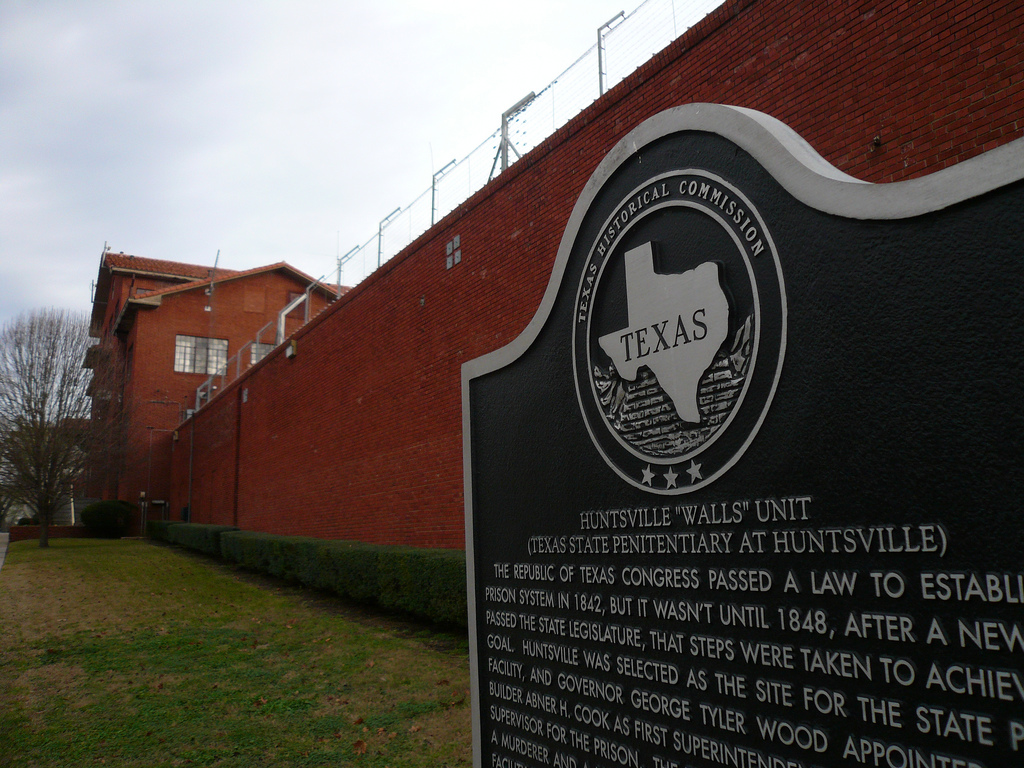 I grew up in Huntsville, Texas-the city where death row inmates are ultimately executed. Growing up, lots of people I knew worked for the Texas Department of Corrections, or “TDC” as locals refer to it. People at church often showed up on Sunday in prison guard uniforms-either en route to work or just finishing up a shift. We had friends who lived in homes owned by TDC. Trustees worked in their yards. We became accustomed to finding out that a prisoner had escaped and that a search was on. We lived a mile or two away from a couple of prisons, so I guess we could’ve been scared, but never were. You could tell when prisoners had been released because you could see people walking around in our sad little downtown area, looking oddly out of place in ill-fitting, dated clothing. Prisons and prisoners were just part of the landscape of our town.
I grew up in Huntsville, Texas-the city where death row inmates are ultimately executed. Growing up, lots of people I knew worked for the Texas Department of Corrections, or “TDC” as locals refer to it. People at church often showed up on Sunday in prison guard uniforms-either en route to work or just finishing up a shift. We had friends who lived in homes owned by TDC. Trustees worked in their yards. We became accustomed to finding out that a prisoner had escaped and that a search was on. We lived a mile or two away from a couple of prisons, so I guess we could’ve been scared, but never were. You could tell when prisoners had been released because you could see people walking around in our sad little downtown area, looking oddly out of place in ill-fitting, dated clothing. Prisons and prisoners were just part of the landscape of our town.
Unfortunately, executions (which take place in what’s known as the “Walls Unit“-the “most active execution chamber” in the United States, with 423 executions between 1982 and 2008) were also part of life in our town. I remember seeing pictures in the paper of the grounds outside the Walls Unit before and after midnight executions. There were protesters and what looked like revelers, for lack of a better word. It never sat well with me to know that people were treating an execution like it were a Mardi Gras parade.
But this was Texas, where we pride ourselves more on justice than mercy. If you commit a terrible crime, you have to pay the ultimate price. And that’s that. No questions asked.
Despite my misgivings about capital punishment, I was pro capital punishment until maybe five years ago when I began to get a clearer picture of who our justice system privileges and who it marginalizes. Oh, I’m sure some of the death row prisoners have done truly horrible things; I’m just not convinced that retribution either eliminates the consequences of their crimes or deters others from following suit. And, even worse-it seems that we have enough evidence to suggest that many of the people on death row across the country did not commit the crimes for which they are scheduled to be executed. One stop by The Innocence Project should be enough to convince us that our system is broken. I assume Texas governor Rick Perry–who recently bragged in a national debate that he has not lost any sleep over the 235 executions he has approved in his 11 years as governor–is aware that 273 American citizens have been exonerated since DNA testing became available. During the debate, Perry said, “I’ve never struggled with that at all . . . The state of Texas has a very thoughtful, a very clear process in place of which – when someone commits the most heinous of crimes against our citizens, they get a fair hearing, they go through an appellate process, they go up to the Supreme Court of the United States, if that’s required.”
Perry has ordered the executions of a boy who committed murder at age 17, a man who by all accounts was innocent (Cameron Todd Willingham), and vetoed a ban on the execution of mentally ill inmates. Yet Perry considers himself “pro-life.” Apparently his pro-life stance is limited to the unborn or to people who can afford to deftly navigate our criminal justice system.
How can a governor of a state that is so enthusiastic about executing criminals not lose sleep over this? Even if someone commits a heinous crime and we have incontrovertible DNA evidence, I’d like to think the person with the final authority to order an execution would lose some sleep over it. We’re talking about human life here, in all its ugliness and messiness.
Unfortunately, this problem isn’t limited to Texas, since the Georgia Board of Clemency just denied clemency to Troy Davis, who is scheduled to be executed today, Wednesday, September 21, 2011. There is plenty of evidence to cast doubt on Davis’s guilt, yet our system seems to have run its course. Perry has also been asked to halt the execution of Duane Buck on Thursday, September 22. Buck’s execution would be the second this week and the 11th this year in Texas, with two more prisoners scheduled to be executed next week.
That will make four executions in less than two weeks.
I believe, as I learned in Mormon Sunday School lessons, that “the worth of souls is great in the sight of God.” I don’t claim to have the solutions to what to do with people who commit terrible crimes. But I do know that ending a human life is something that should give us all pause.
;
;
After I wrote this post, I suggested a Mormon Matters podcast re: capital punishment to Dan Wotherspoon and he agreed. Here’s the link!

My only quibble with what you have written is your assumption that Rick Perry is aware… of anything.
Sad but true, James. I keep reading and hearing people say that he’s another George W. Bush, but I think he’s so.much.worse than GWB.
Perry is GWB, but without the brains and heart.
Ed, yes! Seriously! GWB seems like a buffoon, but a well-meaning one. Worthy of trust. Perry is just a low-down dirty snake. Wouldn’t trust him farther than I could throw him.
Wonderful post. Capital punishment has always rubbed me the wrong way, and perhaps that has something to do with growing up in and now currently living in Texas. I find the statistics you mentioned and more about executions in the state of Texas sickening. And I wholeheartedly agree with you that this type of punishments is probably not a strong deterrent, which is the only justification for state killings in my mind. I hear families members of victims say who “at peace” the execution of a person will make them, but that’s not the point of the justice system. Whether or not you choose to be “at peace” with an undoubtedly horrible crime committed against a loved one has nothing to do with whether or not that person is committed to die, and bringing peace to one’s mind is not the why the justice system prosecutes criminals.
And I don’t care how horrible the crimes a man/woman commits in their life. Rejoicing over their death/killing is inhuman.
Heather, you’ve elegantly described all of my emotions, so I have nothing to add, except to hang my head in shame.
Amen.
Really.
I’ve always been a bit baffled as to how many (American) Mormons have no qualms about the death penalty. As you so aptly stated in the post, God has declared the worth of souls to be quite important, so much so that we have examples in the Old Testament of God being willing to spare a majority of wicked people for the sake of just a handful of righteous people. He’s also made it clear (imo) that killing anyone is only ok when he’s said it is. Lastly, the teachings on mercy, forgiveness etc. are also fairly clear, no?
Yet, everyone seems pro-death penalty, without reservations, much like Gov. Perry. I don’t get it. Most homicides are passion crimes. They weren’t committed because someone carefully planned it out, it was in the heat of the moment. So, the death penalty won’t do much to deter, and as you pointed out, hasn’t yet.
But even worse to me is that it doesn’t seem to favor the innocent. If we want to apply scriptural principles it seems to me that we should err on the side of life rather than death. If you executed someone wrongfully, there’s nothing to fix it. If you imprisoned someone for life who’s guilty (or even who’s not guilty) you can still do something about it…
There are horrible crimes out there, and I’m certainly in favor of consequences. But I really don’t get the death penalty, and all those who support it without thinking twice about it.
If life is so sacred that we shouldn’t lightly bring it into this world (extra-marital babies), nor should we lightly take it (suicide, murder, abortions), how can we make death penalties an exception to this? Especially with the poor job the justice system is doing in being just AND correct…
I.just.don’t.get.it!
Timely post since today the blocks around the Walls unit (depicted in your picture above) are barricaded for the execution of one of the men who dragged James Byrd’s body behind a truck in a hate crime. There are protesters out on both sides. According to a Sunday newspaper article, the family of James Byrd will not attend the execution. They have forgiven the offenders and attribute their ability to do this to what their parents taught them. I pray that I can be a parent like James Byrd’s.
Oh, wow, Karin. That was just an unspeakable crime. That would likely qualify for my category of people who might deserve capital punishment. But still–I would lose sleep over it. Definitely, 100% would lose sleep over it. And I expect the leaders of our country to do the same. Lose sleep over their authority to end life.
That is amazing what Byrd’s family said.
It frustrates me that quite often it is the same people pushing for capital punishment who are politically opposed to government programs aimed at helping at risk youth, public education, and prison reform. To me, is shows a gross misunderstanding of how people come to the point of committing atrocious crimes, and a real rejection of the worth of a soul. It is also, to me, a strange way of exacting justice – in order to think that death is exacting justice for terrible crimes it seems that one must believe in a hell of sorts. Death can never equal the pain caused by many of these crimes, and it certainly will never remove the pain caused.